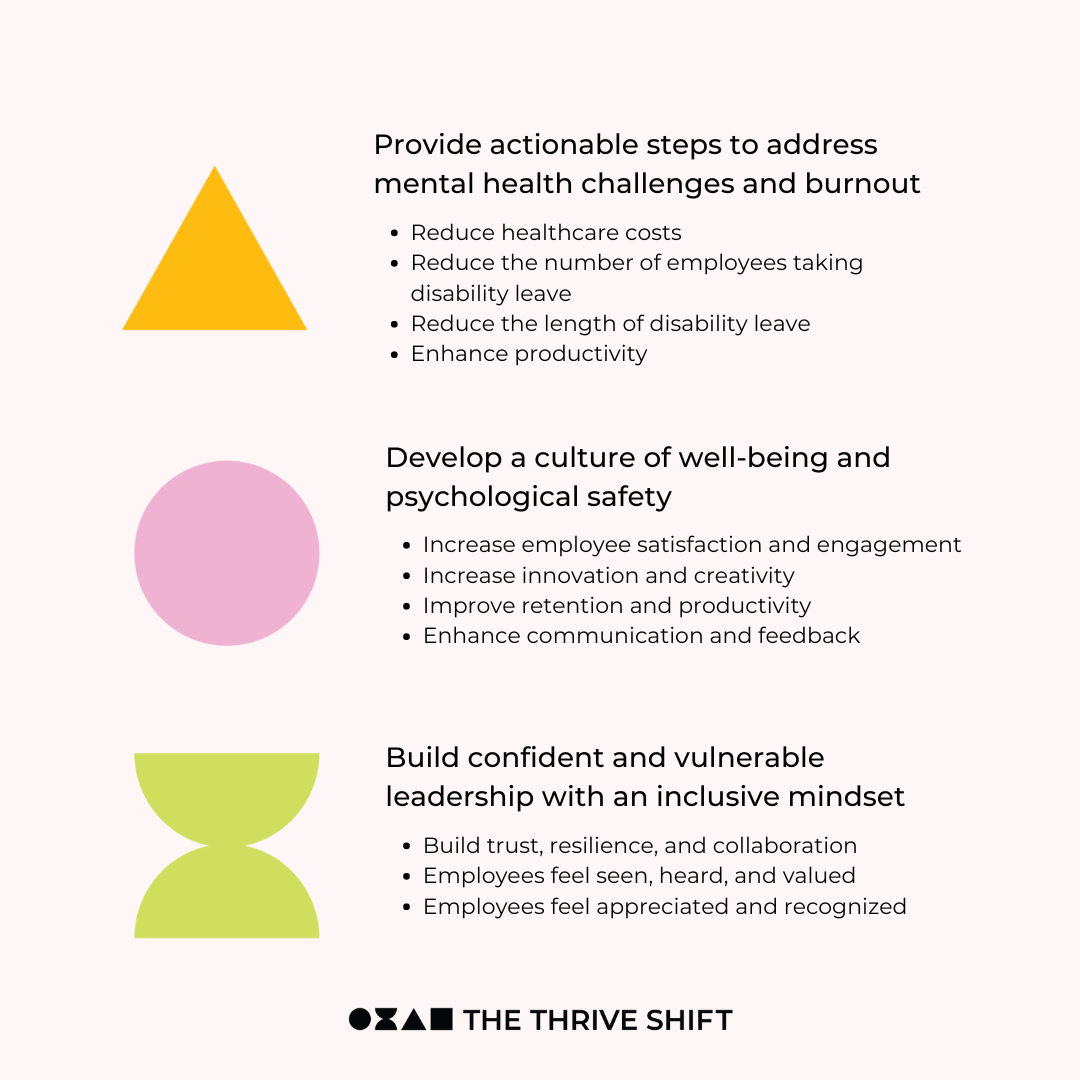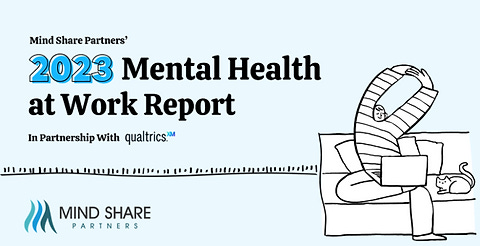When we meet someone new, we often get the inevitable question, "What do you do?"
Since I started my business last November, my answer to this question has become increasingly simplified.
First, saying you're a consultant is the quickest way to see eyes glaze over.
I used to try to explain that I provide speaking, education, and consulting for companies and professional organizations on improving mental health in the workplace.
Today, I start with "I help companies talk about mental health."
I have yet to meet someone that does not connect to this. Either they are a manager in need of resources to help their team struggling with burnout and overwork, an individual dealing with their personal mental health challenges, or a leader trying to figure out how to create a healthier workplace culture.
The issue is that mental health in the workplace is a broad topic and one with many differing views and strategies to support the problems.
Today, I wanted to get back to the basics and provide some information on why supporting mental health in the workplace is good for business, what the research says regarding trends in mental health challenges and needs, and a basic list of best practices to help you get started moving your company in the right direction.
As someone who has been hospitalized many times and used FMLA and medical leave even more, I can tell you from experience that it is best to get on top of these issues early.
As a professional in this space, I know there is hope. In building a solid and committed foundation, your employees will feel valued, heard, and supported to do their best work, business will improve, and your overall culture will thrive.
The Basics

The Business Case
To start, supporting mental health is good for business! Here are three mental health best practices and how they can improve business:
Provide actionable steps to address mental health challenges and burnout
Reduce healthcare costs
Reduce the number of employees taking disability leave
Reduce the length of disability leave
Enhance productivity
Develop a culture of well-being and psychological safety
Increase employee satisfaction and engagement
Increase innovation and creativity
Improve retention and productivity
Enhance communication and feedback
Build confident and vulnerable leadership with an inclusive mindset
Build trust, resilience, and collaboration
Employees feel seen, heard, and valued
Employees feel appreciated and recognized
Here are some recommended resources for the mental health business case:
Want to know how much mental health costs your company? Find out with the National Safety Council's Employer Cost Calculator for Mental Health.
The Research
According to Mind Share Partner's latest research, "the future of mental health will be a 'back to basics'" in which we must focus on culture, safety, and community.
Here are some key findings from Mind Share Partner's 2023 Mental Health at Work Report:
Key Findings
#1. Mental health challenges are improving and worsening.
Mental health symptoms have improved since 2021, but workers’ views of overall mental health also declined.
#2. Employer investments in work are having a net positive impact on mental health.
Unlike previous years, the positive impact of the workplace on workers' mental health outweighed the negative.
#3. Workers want healthy work cultures, not self-care perks.
Healthy and sustainable cultures of work were rated more helpful than therapy and self-care resources.
#4. Employers making meaningful investments in DEIBJ see payoffs.
But marginalized identities (Black, LatinX, AAPI, LGBTQ+) continue to face disproportionate challenges.
#5. Psychological safety declined amidst perceptions of diminishing support from employers.
Less than 40% said their employer prioritizes mental health.
#6. When it comes to the hybrid work debate, employee voice matters.
Workers who were hybrid by choice reported shorter mental health symptoms, less stigma, and a better relationship to work.
*Visit the report linked above for the complete research, guidance, and recommendations.
More recent research on mental health in the workplace:
Best Practices
While there are many best practices to improve employee mental health, the US Surgeon General's Framework for Workplace Mental Health & Well-Being is a great place to start. Its five essentials for supporting employee mental health and well-being capture many top practices in one comprehensive plan.

The US Surgeon General states, "Centered on the worker voice and equity, these five Essentials support workplaces as engines of well-being. Each Essential is grounded in two human needs, shared across industries and roles. Creating a plan with all workers to enact these components can help reimagine workplaces as engines of well-being." The five essentials are as follows:
Protection from Harm
Prioritize workplace physical and psychological safety
Enable adequate rest
Normalize and support mental health
Operationalize DEIA (Diversity, Equity, Inclusion & Accessibility) norms, policies, and programs
Work-Life Harmony
Provide more autonomy over how work is done
Make schedules as flexible and predictable as possible
Increase access to paid leave
Respect boundaries between work and non-work time
Mattering at Work
Provide a living wage
Engage workers in workplace decisions
Build a culture of gratitude and recognition
Connect individual work with organizational mission
Connection & Community
Create cultures of inclusion and belonging
Cultivate trusted relationships
Foster collaboration and teamwork
Opportunity for Growth
Offer quality training, education, and mentoring
Foster clear, equitable pathways for career advancement
Ensure relevant, reciprocal feedback
Suggestions from a Lived Experience Advisor
Here are some of my suggestions as someone who not only works in this space but also lives with a mental illness.
Be preventative:
Like having regular check-ups with your doctor, create a system of support for mental health that focuses on maintaining a healthy environment rather than making adjustments after a crisis.
Bake it in:
Build mental health and wellness into your company policies, systems, projects, and initiatives. Remember that even little things, like your internal communications, can significantly impact mental health.
Think beyond benefits:
While a strong benefits package is powerful for improving mental health, think of ways you can support mental health beyond the benefits package. Examples include building supportive office environments for neurodivergent employees, having well-supported Employee Resource Groups (ERG), and manager training on improving psychological safety.
Start the conversation and keep it going
If you don't talk about mental health in the workplace, consider developing a mental health awareness campaign to normalize the conversation. Once the conversation is started, keep it going year-round to ensure your employees know you are committed to improving mental health in the workplace.
Remember diversity and intersecting identities
None of us live in a bubble; we all have many pieces of ourselves that make up our identity. This means that a wide variety of factors, including race, age, religion, ability, social status, and more, also impact our mental health.
When building mental health programs and improvements in the workplace, keep diversity in mind, knowing that outcomes may differ depending on our needs. Mental health challenges and adverse outcomes disproportionately impact many historically marginalized communities, leading to additional discrimination and challenges.
What are you seeing?
As someone dedicated to this work, I would love to know if your company supports workplace mental health. Share your answer in the poll below.
How I can help
Help start the conversation around mental health in the workplace.
Whether we host a fireside chat or develop a year-long mental health awareness campaign, speaking about mental health openly normalizes the conversation, creating a culture of safety, trust, and support.
Train leaders to build skills to better support their team and their mental health through a focus on compassion, curiosity, and courage.
Advise and consult with leaders on steps they can take to improve their company's workplace mental health.
Educate through online content.
Read my blog and subscribe to my newsletter for regular tips and resources on improving mental health in your workplace and life.
Have thoughts, questions, comments? Send me a message!








